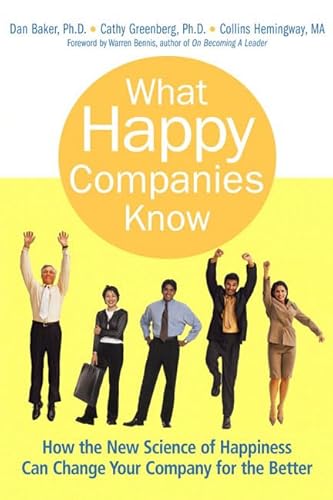"What Happy Companies Know will be one of the most important business books in our time. The science of happiness is a crucial strategy for the health and wellness of both leaders and their organizations if they are truly capable of `leading beyond the walls'-getting the best from people both within and beyond the organization."---Frances Hesselbein, founding president and current chairman, Leader to Leader Institute
"...Relevant to both the CEO concerned with motivating workers and the employee figuring out how to improve personal coping skills."---Publishers Weekly
"As a former U.S. Secretary of Labor, I've been involved in countless business and labor negotiations. I've generally witnessed situations when companies were at their worst, and can't help but think that if they were `happy companies' things might have been less stressful. What Happy Companies Know is filled with brilliant and original ideas that can improve the health of any company-big or small. The executive health and business culture principles are applicable to all areas of labor relations. This book provides the tools necessary to assist companies in the planning and organization essential for profitable and positive negotiations."---W.J. Usery, Jr., former U.S. Secretary of Labor
"The authors' central concept that `happiness' is not a result, but rather the cause of success, will change basic business thinking. Instead of ROI, they focus on ROP, return on people, and encourage applying the techniques of the human potential movement to the process of doing business. This book should be on the reading list of every executive and every board member of every type of organization."---Jonathan Estrin, executive vice president, American Film Institute
"Filled with practical ways to master `the softer side' of business, this guide will help employers effectively implement change and produce more cooperative, innovative, and dedicated employees...Thanks to the authors' thorough research and accessible style, readers will understand not just how to improve their companies, but why it's necessary. Original and intelligent-a `complete blueprint' for building a happy and successful organization."---Kirkus Reports
Penned by three successful psychology and business writers, including the author of the worldwide bestseller, What Happy People Know, this book presents a strong case for introducing the new science of organizational happiness into the workplace.
Because motivated employees are the keystone to business success, companies built around people, positive mindsets and long-term goals consistently out-perform unhappy companies. Illustrated with examples of positive and successful businesses, this book will teach readers how to apply the principles, priorities and motivation of happy companies to their own organizations. Filled with practical ways to master “the softer side” of business, this guide will help employers effectively implement change and produce more cooperative, innovative and dedicated employees. One of the most convincing aspects is the discussion of the evolutionary and behavioral science on which the “science of happiness” premise is based. Thanks to the authors’ thorough research and accessible style, readers will understand not just how to improve their companies, but why it’s necessary.
Original and intelligent―a “complete blueprint” for building a happy and successful organization.
--Kirkus Reports, Vol. 3, Issue 3 (March 31, 2006)
Distinguished by optimism and honesty, a happy company has a "culture in which personal respect, appreciation, and trust become a major reason for its business success." Employees won't need to sing "kumbaya" to accomplish this, assert the authors of this persuasive and encouraging if dense guide. But promoting "happiness" may result in an innovative, collaborative company with employees who are relatively stress-free and attuned to opportunity-plus, happiness will promote the bottom line. Baker (a psychologist and coauthor ofWhat Happy People Know ), Greenberg (a leadership coach) and Hemingway (a business writer and coauthor with Bill Gates ofBusiness @ the Speed of Thought ) investigate the underlying emotional, psychological and even neurological influences on good and bad business practices. Beginning with an examination of fear and aggression as motivators for negative or even passive business decisions, the book later delves into topics including strategies for combating stress both personally and as an organization, employing humility in leadership and developing emotional intelligence. This book is relevant to both the CEO concerned with motivating workers and the employee figuring out how to improve personal coping skills.(June 6)
--Publisher's Weekly (4/17 Issue)
Copyright © 1997-2005 Reed Business Information, a division of Reed Elsevier Inc. All rights reserved.
